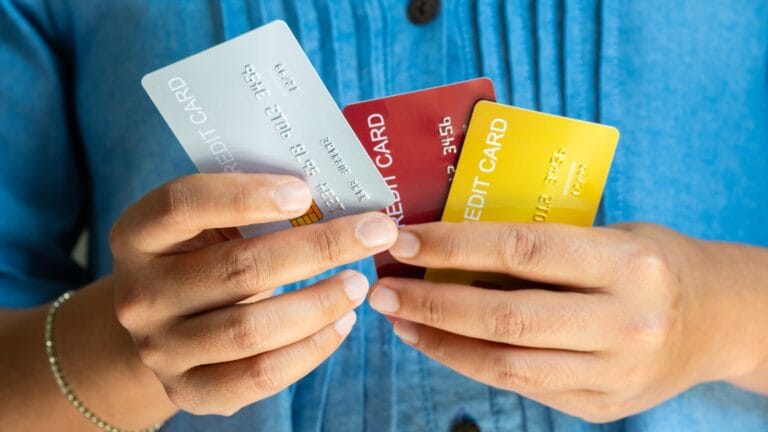How to Easily Get a Credit Card with a 600 CIBIL Score in India Without Rejection
Having a low CIBIL score can be a significant obstacle when applying for a credit card in India. We’ve all been there – the thrill of wanting to own a credit card, only to be met with rejection due to a less-than-ideal credit score.
Don’t worry, you’re not alone! Many individuals face the same challenge. The good news is that there are ways to increase your chances of getting approved for a credit card despite a low CIBIL score. In this article, we’ll guide you through the process, providing valuable tips for getting a credit card with a low credit score.
Key Takeaways
- Understanding the factors that affect credit card approval
- Learning how to improve your CIBIL score
- Discovering the right credit card options for low CIBIL scores
- Tips for a successful credit card application
- Common mistakes to avoid during the application process
Understanding CIBIL Score and Its Impact on Credit Card Approval
A CIBIL score plays a significant role in determining your credit card eligibility in India. It’s a three-digit number that represents your creditworthiness, ranging from 300 to 900.
What Is a CIBIL Score and How Is It Calculated in India
A CIBIL score is calculated based on your credit history, including past loans, credit card payments, and other credit-related data. Factors such as payment history, credit utilization, and the length of your credit history are considered.
Where a 600 Score Stands in the CIBIL Range
A score of 600 is considered average in the Indian credit scoring system. While it’s not an excellent score, it’s also not very poor. Credit card approval with a 600 CIBIL score can be challenging but not impossible.
How Indian Banks Evaluate Applicants with a 600 CIBIL Score
Indian banks evaluate applicants with a 600 CIBIL score by considering various factors beyond just the score. These include income stability, employment history, and existing credit relationships. Banks may also look at the reason for any past credit defaults or late payments.
Evaluation Factor | Importance |
Credit History | High |
Income Stability | Medium |
Employment History | Medium |
Understanding these factors can help you improve your credit card eligibility even with a 600 CIBIL score.
Why Getting a Credit Card with a600 CIBIL Score Can Be Challenging
Indian banks often view applicants with a 600 CIBIL score as high-risk, making credit card approval challenging. This perception is rooted in the credit history and score analysis that banks undertake before approving any credit card application.
Common Rejection Reasons from Indian Banks
Banks in India typically reject credit card applications from individuals with low CIBIL scores due to the associated risk of default. Common reasons include a history of late payments, high credit utilization, and multiple credit inquiries within a short period.
The Credit History Paradox for First-Time Applicants
First-time applicants often face the credit history paradox, where they lack a credit history to demonstrate their creditworthiness. This makes it difficult for banks to assess their ability to manage credit.
Impact of Previous Loan Defaults
Previous loan defaults significantly impact your credit score and credit card approval chances. Defaults are considered serious negative marks and can lead to a substantial decrease in your CIBIL score.
Effect of Multiple Recent Credit Inquiries
Multiple recent credit inquiries can also negatively affect your credit score. Banks view multiple inquiries as a sign of high credit dependency, which can lower your approval chances.
“A good credit score is crucial for credit card approval. It reflects an individual’s credit behavior and history.”
How to Easily Get a Credit Card with a600 CIBIL Score in India Without Rejection
With the right steps, you can increase your chances of getting approved for a credit card even with a 600 CIBIL score. To achieve this, it’s crucial to understand the factors that influence your credit card application and take proactive measures to enhance your creditworthiness.
Conducting a Personal Credit Assessment
Before applying for a credit card, conducting a personal credit assessment is vital. This involves checking your credit report for any errors or negative marks that could be affecting your score. You can request a free credit report from CIBIL or other credit bureaus in India. Reviewing your report helps you understand your credit history and identify areas for improvement.
As CIBIL states, “A good credit score is a reflection of your credit behavior.” Ensuring the accuracy of your credit report is the first step towards improving your credit score.
Targeting Banks with Lenient Credit Score Requirements
Not all banks have the same credit score requirements for approving credit cards. Some banks are more lenient than others, making it easier for individuals with a 600 CIBIL score to get approved. Researching and targeting these banks can significantly improve your chances.
Bank | Credit Score Requirement |
HDFC Bank | 600+ |
SBI Cards | 650+ |
ICICI Bank | 600+ |
Documentation Preparation for Maximum Approval Chances
Preparing the necessary documentation is critical for a successful credit card application. This includes income proof, address verification, and identity proof.
Income Proof Optimization
Your income proof is a crucial document that demonstrates your ability to repay the credit card debt. Ensure that your income documents are up-to-date and reflect your current financial situation.
Address and Identity Verification
Accurate address and identity verification are essential for the application process. Make sure you have the required documents, such as Aadhaar, PAN, and utility bills, to prove your identity and address.
As an example,
“Having the right documents ready can make the application process smoother and increase your chances of approval,”
By following these steps and being prepared, you can enhance your chances of getting a credit card with a 600 CIBIL score. Remember, it’s not just about the score; it’s about demonstrating responsible credit behavior.
Also Read :- Top 5 Credit Cards with Lounge Access Under ₹500 Annual Fee
Best Credit Cards for Applicants with a600 CIBIL Score in India
With a 600 CIBIL score, you’re not out of the credit card market; several banks offer cards tailored for average scores. We will explore some of the best credit card options available from major Indian banks.
HDFC Bank Credit Card Options for Average Scores
HDFC Bank offers a range of credit cards that are accessible to individuals with a 600 CIBIL score. Their credit card options come with various benefits, including cashback, reward points, and travel perks. For instance, the HDFC Bank Cashback Card is a popular choice, offering cashback on dining, fuel, and movie tickets.
SBI Card Products Suitable for 600 CIBIL Range
SBI Card is another major player that caters to individuals with average credit scores. They offer a variety of credit cards, such as the SBI Card SimplySAVE, which provides reward points on dining, grocery shopping, and department store purchases. SBI Card products are designed to be inclusive, offering benefits that align with the spending habits of cardholders.
ICICI Bank Credit Cards with Easier Approval
ICICI Bank also provides credit card options that are relatively easier to get approved for, even with a 600 CIBIL score. Cards like the ICICI Bank Sapphire Credit Card offer dining and entertainment benefits, along with travel insurance and reward points. ICICI Bank’s credit cards are designed to meet diverse customer needs.
Axis Bank and Kotak Mahindra Options
Axis Bank and Kotak Mahindra Bank offer competitive credit card products for individuals with a 600 CIBIL score. Axis Bank’s Maxima Credit Card and Kotak Mahindra Bank’s Kotak Mahindra Card offer attractive reward structures and benefits. These cards provide a good balance between rewards and credit limits, making them suitable for various financial needs.
When applying for these credit cards, it’s essential to check the specific eligibility criteria and required documentation. By understanding the features and benefits of each card, you can make an informed decision that best suits your financial situation.
Secured Credit Cards: Your Gateway to Credit Approval
For individuals struggling with a 600 CIBIL score, secured credit cards offer a viable pathway to credit approval. These cards are designed to be more accessible, providing an opportunity to build or rebuild credit.
How Fixed Deposit-Backed Cards Work in Indian Banks
Secured credit cards in India are typically backed by a fixed deposit, which acts as collateral for the credit limit extended to the cardholder. This reduces the risk for the lender, making it more feasible for individuals with lower CIBIL scores to get approved.
Key benefits include:
- Higher approval rates despite a lower CIBIL score
- Opportunity to build or rebuild credit history
- Flexibility in usage similar to regular credit cards
Top Secured Credit Card Options from Major Indian Banks
Several major banks in India offer secured credit card options. Let’s examine a couple of them:
SBI Bank Secured Card Features
The State Bank of India (SBI) offers secured credit cards with competitive features, including:
- Credit limit equivalent to the fixed deposit amount
- Rewards and benefits on spends
- Option to upgrade to an unsecured card after a certain period
ICICI Bank Secured Card Benefits
ICICI Bank’s secured credit card comes with its own set of benefits, such as:
- Flexible payment options
- Insurance coverage on certain transactions
- Easy online account management
Bank | Credit Limit | Rewards | Upgrade Option |
SBI Bank | Equivalent to fixed deposit | Yes | Available |
ICICI Bank | Equivalent to fixed deposit | Yes | Available |
Timeline for Upgrading to Unsecured Cards
One of the significant advantages of secured credit cards is the potential to upgrade to unsecured cards after demonstrating responsible credit behavior over time. Typically, this can happen within 12 to 18 months of consistent payments and credit utilization.
Alternative Paths to Credit Card Approval in India
Alternative credit card options are available in India for those with a 600 CIBIL score, offering a second chance. While a 600 CIBIL score may not be ideal, there are various routes to explore for credit card approval.
Salary Account-Based Credit Cards
One viable option is salary account-based credit cards. Many Indian banks offer credit cards to individuals who have a salary account with them. This can be a great way to get a credit card even with a relatively lower CIBIL score.
Becoming an Authorized User on Family Member’s Card
Another alternative path is becoming an authorized user on a family member’s credit card. This not only helps in getting a credit card but also aids in building your credit history if the primary cardholder has a good credit behavior.
Retail and Co-Branded Cards with Easier Approval
Retail and co-branded credit cards often have more lenient approval criteria compared to regular credit cards. For instance:
Shoppers Stop-ICICI Card
The Shoppers Stop-ICICI Card is a popular co-branded card that offers benefits at Shoppers Stop stores.
Amazon Pay ICICI Card
The Amazon Pay ICICI Card is another co-branded card that offers rewards on Amazon purchases.
Card Name | Issuer | Key Benefits |
Shoppers Stop-ICICI Card | ICICI Bank | Rewards on Shoppers Stop purchases |
Amazon Pay ICICI Card | ICICI Bank | Rewards on Amazon purchases |
These alternative paths can significantly improve your chances of getting a credit card in India despite having a 600 CIBIL score. By exploring these options, you can start building or rebuilding your credit history.
Application Strategies to Maximize Approval Chances
To increase your chances of getting approved for a credit card with a 600 CIBIL score, it’s essential to employ effective application strategies. By understanding the optimal timing, leveraging existing bank relationships, and choosing the right application channel, you can enhance your creditworthiness.
Optimal Timing for Credit Card Applications
Timing plays a crucial role in credit card applications. Avoid applying during periods of high credit inquiries, as this can negatively impact your CIBIL score. Instead, apply when your credit profile is stable.
Relationship Banking: Leveraging Existing Bank Accounts
Having an existing relationship with a bank can significantly improve your chances of approval. Banks are more likely to approve applications from customers with whom they have an established history. Ensure your accounts are well-maintained to build a positive banking history.
In-Branch Applications vs. Online Portals
The choice between in-branch and online applications depends on your personal preference and banking history. In-branch applications allow for personal interaction, which can be beneficial if you have a pre-existing relationship with the bank.
Documents to Carry for In-Person Applications
- Identity proof (Aadhaar card, passport)
- Address proof (utility bills, rental agreement)
- Income proof (salary slips, bank statements)
Tips for Online Application Forms
- Ensure all information is accurate and up-to-date.
- Double-check for any missing fields or documents.
- Use a secure internet connection to protect your data.
By following these strategies, you can maximize your chances of getting approved for a credit card despite a 600 CIBIL score.
Application Channel | Advantages | Disadvantages |
In-Branch | Personal interaction, potential for better negotiation | Time-consuming, limited to bank hours |
Online | Convenient, faster processing, available 24/7 | Lack of personal interaction, potential for technical issues |
Quick Ways to Boost Your CIBIL Score Before Applying
Boosting your CIBIL score before applying for a credit card can significantly enhance your approval chances in India. A good CIBIL score indicates to lenders that you’re a responsible borrower, making them more likely to approve your credit card application.
Clearing Outstanding Payments and Dues
One of the most effective ways to improve your CIBIL score is by clearing any outstanding payments and dues. Late payments can significantly lower your score, so ensuring timely payments is crucial. We recommend checking your credit report regularly to identify any outstanding dues.
Identifying and Disputing Credit Report Errors
Errors in your credit report can negatively impact your CIBIL score. We suggest regularly reviewing your credit report to identify any inaccuracies and disputing them with the credit bureau. Correcting these errors can lead to a quick improvement in your score.
Optimizing Credit Utilization on Existing Accounts
Optimizing your credit utilization ratio is another key strategy. We advise keeping your credit utilization below 30% of your available credit limit. High credit utilization can harm your score, so managing your credit card balances is essential.
Avoiding Multiple Loan Applications in Short Periods
Avoiding multiple loan or credit card applications in a short period is crucial, as this can indicate to lenders that you’re taking on too much debt. We recommend spacing out your applications if you need to apply for multiple credit products.
Action | Impact on CIBIL Score |
Clearing Outstanding Dues | Positive |
Disputing Credit Report Errors | Positive |
Optimizing Credit Utilization | Positive |
Avoiding Multiple Loan Applications | Positive |
By implementing these strategies, you can improve your CIBIL score, enhancing your chances of getting approved for a credit card.
Managing Rejection and Next Steps
A rejected credit card application doesn’t mean you’ll never get approved; it’s a stepping stone to improving your creditworthiness. When faced with rejection, there are several steps you can take to enhance your chances of approval in the future.
Obtaining and Understanding Rejection Reasons
The first step after a rejection is to understand why your application was not approved. Banks typically provide a reason for rejection, which could range from a low CIBIL score to high credit utilization. Identifying the exact reason is crucial as it helps you address the specific issue.
Cooling-Off Period: When to Reapply to Indian Banks
After a rejection, it’s advisable to wait for a certain period before reapplying. This cooling-off period varies among banks but generally ranges from 3 to 6 months. Using this time to improve your credit profile can significantly enhance your chances of approval.
Building Credit Through Small Loans and Timely Payments
One effective way to build credit is by taking small loans and ensuring timely payments. This demonstrates your creditworthiness and responsibility to potential lenders. Timely payments positively impact your CIBIL score, making it easier to get approved for credit cards in the future.
Credit Builder Programs Available in India
Credit builder programs are designed to help individuals build or rebuild their credit. These programs, offered by various financial institutions in India, allow you to make regular payments that are reported to credit bureaus, thereby improving your credit score over time.
By understanding the reasons for rejection, observing a cooling-off period, building credit through small loans, and utilizing credit builder programs, you can significantly improve your chances of getting approved for a credit card.
Conclusion: Building a Positive Credit Journey Despite a 600 CIBIL Score
We understand that having a 600 CIBIL score can make it challenging to get credit card approval in India. However, by following the tips and strategies outlined in this article, you can improve your creditworthiness and increase your chances of getting approved for a credit card in the future.
To start building a positive credit journey, it’s essential to understand the factors that affect credit card approval and adopt credit building strategies. By conducting a personal credit assessment, targeting banks with lenient credit score requirements, and preparing necessary documentation, you can enhance your credit score and increase your chances of approval.
Additionally, considering credit card approval with low CIBIL score options such as secured credit cards or alternative paths like salary account-based credit cards can be beneficial. By adopting these strategies and maintaining a positive credit history, you can achieve long-term financial health and enjoy the benefits of credit card ownership.
FAQ
Q.1 What is a CIBIL score, and how is it calculated?
A CIBIL score is a three-digit number representing your creditworthiness, calculated based on your credit history, payment behavior, and other factors.
Q.2 How do Indian banks evaluate applicants with a 600 CIBIL score?
Indian banks evaluate applicants with a 600 CIBIL score by considering various factors, including their credit history, income, and employment stability.
Q.3 What are the common reasons for credit card rejection in India?
Common reasons for credit card rejection include low CIBIL score, poor credit history, insufficient income, and multiple recent credit inquiries.
Q.4 How can I improve my chances of getting a credit card with a 600 CIBIL score?
To improve your chances, conduct a personal credit assessment, target banks with lenient credit score requirements, and prepare necessary documentation.
Q.5 What are secured credit cards, and how do they work?
Secured credit cards are backed by a fixed deposit, reducing the risk for the lender, and can help you establish or rebuild your credit history.
Q.6 Can I get a credit card with a 600 CIBIL score without a fixed deposit?
Yes, you can explore alternative paths, such as salary account-based credit cards, becoming an authorized user, or applying for retail and co-branded cards.
Q.7 How can I boost my CIBIL score before applying for a credit card?
You can boost your CIBIL score by clearing outstanding payments, identifying and disputing credit report errors, optimizing credit utilization, and avoiding multiple loan applications.
Q.8 What should I do if my credit card application is rejected?
If rejected, obtain and understand the rejection reasons, observe a cooling-off period, and consider building credit through small loans and timely payments.
Q.9 Are there any credit builder programs available in India?
Yes, credit builder programs are available in India, which can help you enhance your creditworthiness and improve your chances of getting approved for a credit card.
Q.10 How can I increase my credit score for credit card eligibility?
You can increase your credit score by maintaining a good credit history, making timely payments, and keeping credit utilization low.
Found this post helpful?
If you’re trying to get a credit card with a low CIBIL score, we hope this guide gave you a clear starting point. Your journey to financial recovery is possible — one smart step at a time.
Have a question or personal story?
Drop it in the comments — let’s grow and learn together.








